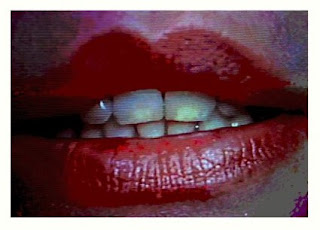Daniel Silver:
Kissing (2024) [1]
Statuario Altissimo marble and bronze,
with a stainless steel baseplate
I.
It wasn't until I saw Daniel Silver's sculpture of bronze lovers "'stuck together like two jujube lozenges'" [2] that I realised the full horror of an oft-quoted remark made by Georges Bataille:
A kiss is the beginning of cannibalism ...
II.
What this means is that there's an accursed link between eating and eroticism.
For consumption, like sex, is a way in which separate beings not only communicate, but fatally come into touch, enabling the self and non-self to bridge their discontinuous existence as individuals [3].
Or, to put it another way, sexual desire that drives us to press lips together and insert tongues in mouths (and other bodily orifices) and the voracious desire to devour the other, are as closely connected as Eros and Thanatos in a general economy in which non-productive expenditure (via acts that often violently transgress social norms) is key.
Herman Hupfeld may insist that "a kiss is just a kiss" [4], but, as a matter of fact, nothing is ever so innocent or free from context (i.e., a whole network of meaning and significance).
III.
Apparently, anthropologists disagree on whether kissing is instinctual or an example of learned behaviour.
Those who favour the former point to the fact that other animals appear to kiss (whilst ignoring that not all humans engage in the activity) [5].
Those who favour the latter, argue that kissing in its modern (romantic) form has evolved from activities such as suckling or premastication in early human cultures [6] and there is certainly evidence to support the claim that cataglottism [7] has developed from mouth-to-mouth regurgitation of food - or kiss-feeding - either from parent to offspring, or between lovers.
IV.
It might be noted in closing, that man's will to merger or primal unity - be it via the sexual penetration of a lover's body or the consumption of their flesh - is what some describe as a death instinct, seeing as it conflicts with the "central law of all organic life"; namely, that each organism is "intrinsically isolate and single" [8].
The problem, of course, is that another vital law is that we need and desire one another; that each organism only thrives via intimate contact with others.
Fortunately, coition is only ever a coming-close-to-death; a meeting but not a mixing of separate blood-streams. There is no real union during sexual intercourse and, once the crisis is over, the sovereign individuality of each party remains intact.
However, that's not the case in cannibalism, or what might be called a hard-vore scenario, wherein at least one party is going to be semi-digested and certainly won't be able to enjoy a cigarette afterwards as a singular being.
Notes
[1] Daniel Silver's Kissing (2024) - in part inspired by Constantin Brâncuși's famous sculpture, The Kiss (1907-08) - features in his Uncanny Valley exhibition currently showing at the Frith Street Gallery (Golden Square, London), until 18 January 2025. The photo is by Ben Westoby, courtesy of the artist and gallery. For more details visit: frithstreetgallery.com
[2] This humorous remark is made by Rawdon Lilly in D. H. Lawrence's novel Aaron's Rod, ed. Mara Kalnins (Cambridge University Press, 1988), p. 91.
[3] See Georges Bataille, The Accursed Share: An Essay on General Economy, Vol. I, trans Robert Hurley, (Zone Books, 1988). Readers interested in Bataille's interesting (somewhat idiosyncratic) take on death and sensuality might also like to see his work entitled Erotism, trans. Mary Dalwood (City Light Books, 1986). It is also available as a Penguin edition entitled Eroticism (2001).
[4] Herman Hupfeld (1894-1951) was an American songwriter, whose most notable composition was 'As Time Goes By' (1931), which featured in the 1942 film Casablanca (dir. Michael Curtiz), performed by Dooley Wilson as Sam. The line quoted here is taken from the song.
[5] I'm pretty sure that Heideggerians would protest that although many other animals exchange what appear to be kisses of affection, they are not kisses in the full sense (that kissing is something that only human beings can fully experience due to our ontologically unique status).
[6] Another theory suggests that kissing originated during the
paleolithic era, when cavemen would taste the saliva of females in
order to determine whether they would make a healthy mate (or perhaps a hearty meal).
[7] Cataglottism - more commonly known as French kissing - involves extensive tongue activity in order to induce sexual arousal and not merely the pressing together of lips.
As Freud rightly says, it is strictly speaking a type of kinky deviation from normal sexual activity, even if no one acknowledges or rejects it as such. See his Introductory Lectures on Psychoanalysis (1920), in which he writes: "Even a kiss can claim to be described as a perverse act, since it consists in the bringing together of two oral erotogenic zones instead of the two genitals."
Later, Freud comments on how strange it is that the lips have such erotic value amongst lovers - including
the most sophisticated ones - in spite of the fact that (technically) they are not sexual organs, but
constitute the entrance to the digestive tract.
[8] D. H. Lawrence, 'Edgar Allan Poe', Studies in Classic American Literature, Final Version (1923), ed. Ezra
Greenspan, Lindeth Vasey and John Worthen, (Cambridge University Press,
2003), p. 67.
Further reading: those who are interested in this topic might like to see Ursula de Leeuw's essay 'A kiss is the beginning of cannibalism: Julia Ducournau's Raw and Bataillean Horror', in Exchanges: The Interdisciplinary Research Journal, Volume 7, Issue 2, (2020), pp. 215-228. Click here for an online pdf.

